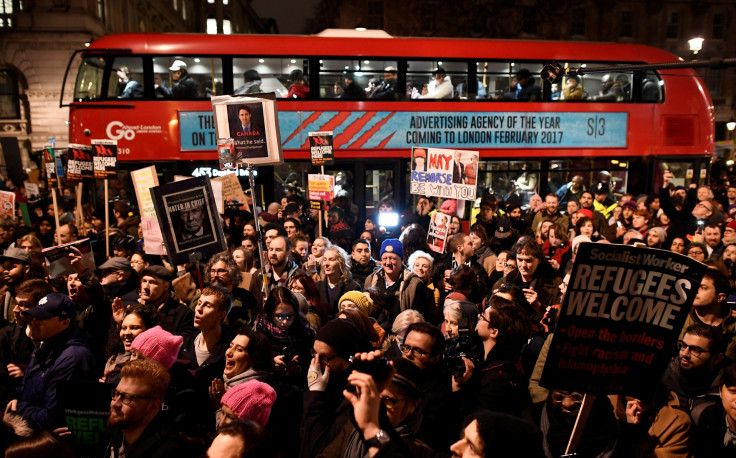US-Muslim Relations: After Controversial Immigration Ban, Germany, China, Iraq, Iran And Other Governments' Officials Weigh In

Leaders from around the world have reacted to President Donald Trump's decision to halt restrict all immigration from seven Muslim-majority countries in the Middle East, with many slamming the newly inaugurated leader's controversial policy.
Trump's executive order immediately voided all visas from Iraq, Iran, Libya, Syria, Somalia, Sudan and Yemen, nations whose nationals his administration deemed particularly threatening to national security. The scope and sudden implementation of the order caused chaos and outrage throughout the U.S. with scores of foreigners being detained at airports despite having previously valid travel documents. Political leaders have since commented on the developing situation as well as Trump's remarks toward immigrants in general.
Germany
"The chancellor regrets the entry ban imposed by the U.S. government against refugees and nationals from certain countries," German Chancellor Angela Merkel's spokesperson Steffen Seibert said Sunday in a statement. "She is convinced that even in the necessarily resolute battle against terrorism it is not justified to place people from a certain origin or belief under general suspicion."
France
"Faced with an unstable and uncertain world, withdrawal into oneself is a dead-end response," French President Francois Hollande reportedly told Trump in a phone call, adding that defending democratic ideals meant complying with "the principles on which it is founded, in particular the acceptance of refugees."
United Kingdom
"Immigration policy in the United States is a matter for the government of the United States, just the same as immigration policy for this country should be set by our government," U.K. Prime Minister Theresa May, a political ally of Trump, said through a spokesman.
While far-right politician Nigel Farage praised Trump, other prominent political figures in the U.K. attacked Trump's policy and some criticized May for not condemning it. Foreign Secretary Boris Johnson, who has supported Trump in the past, said it was "divisive and wrong to stigmatize because of nationality," while Labor Party leader Jeremy Corbyn censured May for not standing up to Trump. Saddiq Khan, the first Muslim mayor of London, called Trump's restrictions "“shameful and cruel."
See posts, photos and more on Facebook.
Norway
"Refugees and other people must be treated equally regardless of religion, nationality and skin color. The USA violates this by refusing entry," Norwegian Prime Minister Erna Solber told Norwegian newspaper Verdens Gang Sunday. "We must be resolute in the fight against terrorism, but I do not think it is right to cut so many people from certain countries."
China
"China believes that adjusting immigration and entry and exit policy is an act within each country's sovereignty," the China's foreign ministry told Reuters in a statement Monday, adding, "At the same time, relevant moves must also consider the reasonable concerns of relevant countries."
Canada
"To those fleeing persecution, terror & war, Canadians will welcome you, regardless of your faith. Diversity is our strength #WelcomeToCanada," Canadian Prime Minster Justin Trudeau tweeted Saturday.
To those fleeing persecution, terror & war, Canadians will welcome you, regardless of your faith. Diversity is our strength #WelcomeToCanada
— Justin Trudeau (@JustinTrudeau) January 28, 2017
Turkey
"Regional issues cannot be solved by closing the doors on people. We expect the Western world to lighten Turkey's burden," Turkish Prime Minister Binali Yildirim told reporters Saturday at a press conference.
Iraq
"We are against this stance from the new administration," Sadiq al-Laban said in a statement Monday, adding: "We hope that the American administration will rethink ... this decision."
Iraq's parliament successfully voted to call on Prime Minister Haider al-Abadi's government to condemn to implement a reciprocal ban against U.S. citizens entering Iraq, where U.S. forces are assisting the military and allied militias in battling the Islamic State group, also known as ISIS. The foreign ministry and influential Shiite cleric Moqtada al-Sadr also slammed Trump's policy.
Iran
"#MuslimBan will be recorded in history as a great gift to extremists and their supporters," Iranian Foreign Minister Zarif tweeted Saturday, adding that the "international community needs dialogue & cooperation to address the roots of violence & extremism in a comprehensive & inclusive manner."
Zarif said his ministry would "take reciprocal measures to protect citizens," but that Iran's ban against U.S. citizens would not be retroactive like Trump's.
Full statement of the Ministry of Foreign Affairs of the Islamic Republic of Iran on the #MuslimBan. 6/7 pic.twitter.com/Y3gAxT0B8m
— Javad Zarif (@JZarif) January 28, 2017
Sudan
"The Sudanese citizens living in the United States are known for their good reputation, respect for American laws, and their lack of involvement in radical and criminal acts,” the Foreign Affairs Ministry said in a statement.
The Sudanese government has reportedly summoned the U.S. ambassador over the incident and has called on the restrictions to be lifted.
Yemen
"The decision to ban travel for Yemeni passport holders into the United States supports extremists and sows discord among peoples," Yemeni Foreign Minister Abdel Melek al-Mekhlefi tweeted Monday. In the military's first operation under Trump, a U.S. commando, 14 militants and around 30 civilians, including an 8-year-old girl, were killed Monday.
قرار حظر السفر لحاملي الجوازات اليمنية الى الولايات المتحدة يدعم المتطرفين ويزرع الفرقة بين الشعوب
— عبدالملك المخلافي (@almikhlafi59) January 29, 2017
الخارجية اليمنية تعبر في بيانها عن الاستياء من القرار الامريكي بحظر السفر الى الولايات المتحدة لحاملي الجوازات اليمنية الذي لامبرر له
— عبدالملك المخلافي (@almikhlafi59) January 29, 2017
© Copyright IBTimes 2024. All rights reserved.





















